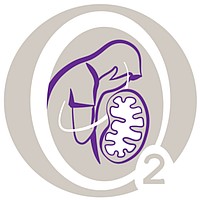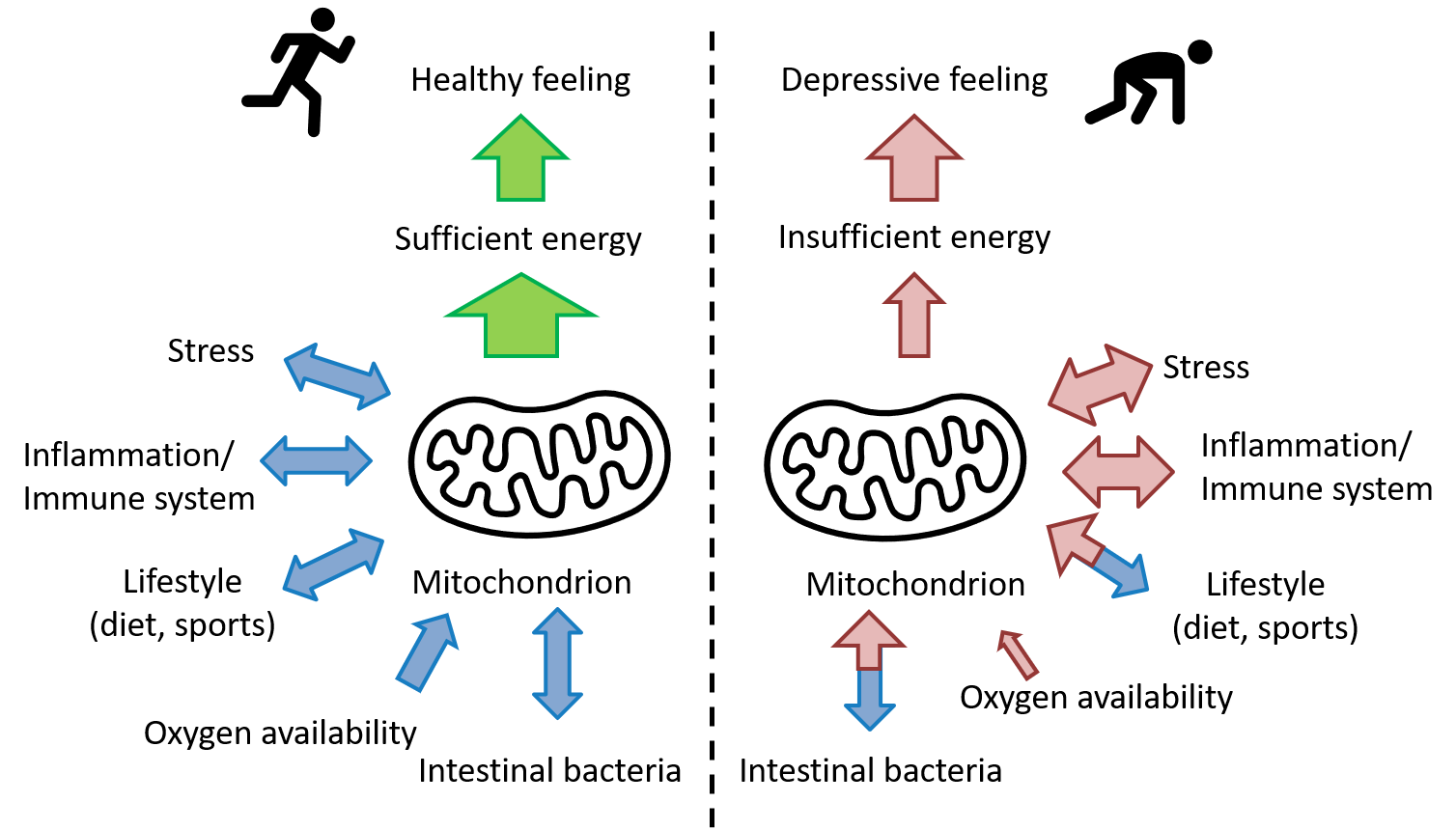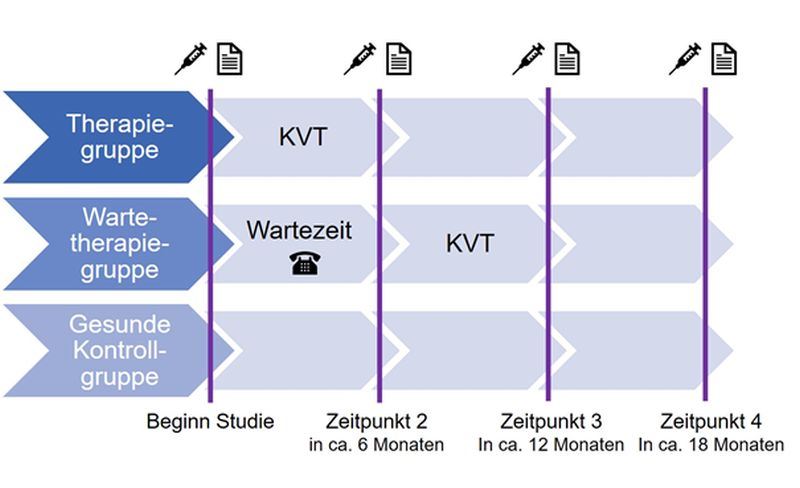MitO2Health
Biological mechanisms of depression and their significance for the success of therapy

Welcome to the information page for the "MitO2Health" study. The study focuses on depression as a metabolic disorder and in particular on the role of mitochondrial bioenergetics ("Mit") and oxygen homeostasis ("O2") in the aetiology and therapy of depression ("Health"). Here is some information about the content and process of the study, our research interests, and relevant information for those interested. If you have any questions, please feel free to contact us by phone at 0731-5026593 or by email at mito2health(at)uni-ulm.de.
About MitO2Health
Relevance:
Depression is a common mental illness worldwide and, in addition to individual suffering, also causes high socioeconomic costs. The effect of psychotherapy and antidepressant medication is not satisfactory for all sufferers. With MitO2Health we want to understand whether biological changes are responsible for individual differences in the success of therapy as well as the sustainability of the therapeutic outcome. A deeper understanding of the biological mechanisms of depression is the central prerequisite for the further development and improvement of treatment offers.
Biological Backround:

Stressful life events and stress can result in major depressive disorder. Depression is much more than a disease of the brain. Moreover, it is accompanied by far-reaching - mostly stress-induced - changes in the entire body. The focus of this study is on mitochondria, which are small "powerhouses of the cell" which provide energy to our cells. To produce the energy, they gradually break down energy-rich molecules such as sugar and fatty acids, which we ingest through food. Therefore, the mitochondria need the oxygen that we take in through our lungs by breathing and that is transported to our cells by the blood. In addition to energy production, mitochondria are involved in a variety of important mechanisms, such as the control of inflammatory processes.
In current studies it is shown that depression is associated with reduced energy production by the body's cells and increased activity of the immune system (see figure on the left). Changes in oxygen transport in the blood and oxygen supply to the body's cells have also been observed. Therefore, within the framework of MitO2Health, we are investigating the importance of oxygen supply and cellular energy production as possible mechanisms of the development of chronic inflammatory processes and psychological symptoms of depression. We also expect that the experience of stress, but also lifestyle factors such as diet and regular exercise, as well as nutrient uptake in the gut, have an impact on cellular processes and influence the biological mechanisms of depression.
In MitO2Health, depressed patients receive scientifically based cognitive behavioral therapy for depression (CBT-D). The comparison with a waiting group of depressive patients and healthy control subjects will show whether cognitive behavioral therapy not only leads to symptomatic improvements of depression, but also shows a positive effect on the putative biological changes of depression at the level of oxygen supply and cellular energy production. In addition, we are investigating whether specific biological processes (such as cellular energy production) are limiting factors for therapeutic success.
Our goal is to identify biological alterations as the cause of depression and to understand their importance for the treatability of depression.
What is the course of the study?

The study includes four time points of measurement over the course of approximately 1,5 years. After an initial screening on the phone, we will invite the participants to the Psychotherapeutic University Outpatient Clinic at the University of Ulm. Experienced clinical staff will conduct a comprehensive psychological diagnosis. Depressed participants (N= 200) will be randomly assigned to either be part of the treatment group and immediately receive CBT. Alternatively, they will become part of the waiting list group and also receive 6 months of CBT after an 6-month waiting period. A healthy control group (N= 100) without current psychological disorders will also be recruited.
In order to examine the long-term effects of the treatment (stability and relapse), participants will be invited to one or two additional assessment appointments after the end of the therapy. As shown in the diagram below, there will be a total of 4 examinations, each 6 months apart.

At each examination point, experienced staff will use interviews and questionnaires to assess your mental and physical condition (including fitness and nutrition) and your experience of stressful life events. We will also take small amounts of blood from you. In the blood, we measure the oxygen and energy supply as well as immune activity. Using non-invasive methods, we also examine your heart activity and the blood perfusion of your brain. You will receive individual feedback on your fitness and nutritional status.
What are your benefits after participation?
- You make an important contribution to the scientific understanding of major depression and to the improvement of therapeutic treatment
- You will receive an individual evaluation of a nutrition diary by a nutritionist
- You will receive feedback on your physical fitness
As a person with a depressive disorder, you have the chance of faster access to therapy: the waiting time for psychotherapy is often unpleasantly long. If you are assigned to the treatment group, your psychotherapy can begin very quickly. If you are taking antidepressant medications, you can continue to take them. You will receive an expense allowance of 10€ for each blood draw.
Healthy control subjects will receive an expense allowance of 40€ for each blood draw.
Who can participate?
Persons with a depressive illness
If you are interested in participating in our study, please register if you:
- are between 18 and 65 years old
- live in Ulm or the surrounding area
- feel depressed for at least the last 2 weeks
- are not currently undergoing psychotherapeutic treatment
- have statutory health insurance
- have no serious chronic neurological, immunological, endocrinological, cardiovascular or pulmonary diseases
- have not received a current/previous diagnosis of post-traumatic stress disorder (PTSD), obsessive-compulsive disorder, schizophrenia, or borderline personality disorder
Control subjects
If you are interested in participating as a control subject, please register if you:
- are between 18 and 65 years old
- live in Ulm or the surrounding area
- feel mentally healthy
- have no serious chronic neurological, immunological, endocrinological, cardiovascular or pulmonary diseases
- have not received a current/previous diagnosis of a mental illness (e.g. depression, anxiety disorder, obsessive-compulsive disorder, schizophrenia, etc.)
Contact
If you are interested in participating in our study or have any questions, please feel free to contact us by phone at 0731-5026593 or by email at mito2health@uni-ulm.de.
Project management and team
Project management
Prof. Dr. Iris-Tatjana Kolassa
Therapeutic management
Dr. Roberto Rojas
Project coordination
Dr. Alexander Behnke
Laboratory Management
Dr. Matthias Mack
Team
M.Sc. R. Nehir Mavioglu
M.Sc. Ellen Bisle
M.Sc. Hannah Keppler
Funded by:

